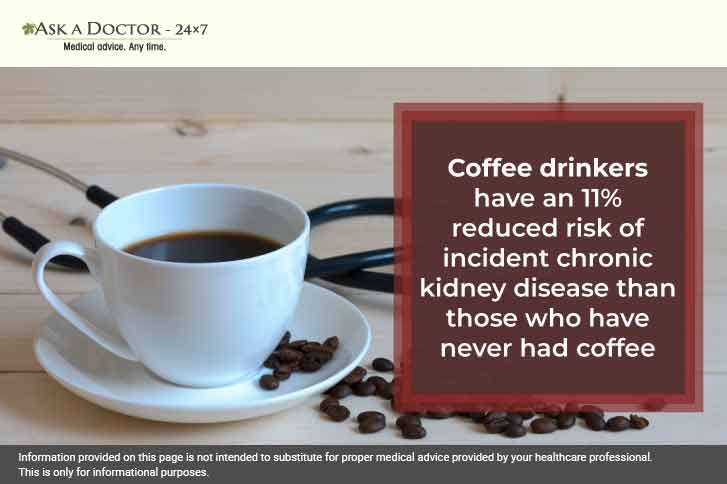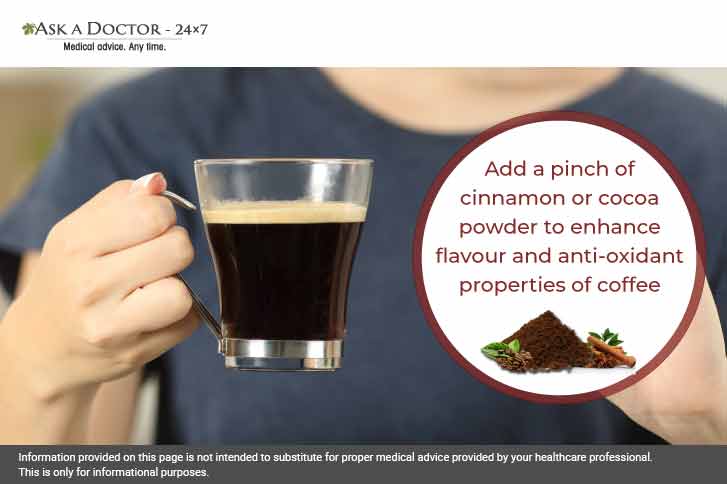Can Drinking Coffee Prevent Kidney Disease: Get The Facts!
With café culture gaining popularity in cities, coffee has attained cult status among young and old alike, making it one of the most favored beverages. Originally from Ethiopia, coffee has become a world-famous brew and is known for its stimulating effects as well as several health benefits but only if limited to drinking less than 3 cups a day. With active ingredients such as caffeine and phenolic compounds that hold anti-oxidative, anti-inflammatory, and anti-thrombotic effects, coffee is found to be a beneficial beverage for our kidneys. Yes! You heard it right! Recent studies have found that drinking one to two cups of coffee regularly can lower your risk of getting kidney disease.
How Does Consuming Coffee Protect You from Kidney Disease?

Coffee is rich in antioxidants such as:
- Caffeine
- Hydroxychloroquine
- Quinides
- Niacin
- Chlorogenic acid
Anti-oxidants prevent atherosclerosis in the kidneys. Atherosclerotic injury to the kidneys is a common reason for the development of chronic kidney disease (CKD). Coffee has an anti-diabetic effect so it improves blood sugar levels and prevents diabetic nephropathy.
According to the Harvard School of Health, drinking coffee daily is associated with reduced risk of many chronic diseases. A cup of brewed coffee contains 80-120 mg of caffeine while a cup of instant coffee has 50-65 mg caffeine.
5 Key Points to Know When Consuming Coffee for Kidney Health

Below are the five things one must keep in mind before including coffee in his or her daily diet:
1. Maintain a balance
While coffee is found to be beneficial in preventing kidney disease, it is important to have it in moderation. Having more than 200 mg of caffeine in a day can cause anxiety and nervousness.
2. Go slow on the sugar
Having your coffee with a lot of sugar is not what makes it healthy. In fact, it can have the opposite effect. Adding too much sugar to your coffee can cause unhealthy spikes in your blood sugar and weight gain. Use a natural sweetener such as Stevia if you can’t do without sugar in your coffee.
3. Consider the right time for consumption
Avoid having coffee with or immediately after your meals. Coffee has tannins that can interfere with iron absorption from food. Also, drinking coffee just before bedtime can give you a sleepless night as caffeine in your cuppa keeps you alert. Refrain from having coffee 3-4 hours before bedtime.
4. Pick non-dairy creamers
Non-dairy creamers made of almond milk, coconut, or soy milk are your best bet when it comes to cutting out extra calories from your coffee. You can also opt for black coffee instead. Black coffee is also a better choice for kidney patients as creamers, milk, and other additives contain some amount of minerals like phosphorous and potassium. These may pose a health risk for people with kidney problems.
5. Say no coffee on an empty tummy
Having coffee on an empty stomach can lead to severe acidity and heartburn. Latest research also shows that this practice can lead to a spike in blood sugar. The best way is munching on a snack with your coffee or drinking it sometime after a meal.
Also, it is important to remember that coffee is a stimulant so it may affect everyone in a different way. Talk to your healthcare provider or dietician about your coffee consumption. Having said this, it’s time to sip on your coffee and bid adieu to your risk of kidney problems.
To know more about how to help your kidneys function better or for any other queries related to kidneys, Consult a Nephrologist online at Ask a Doctor 24x7.
Recently Answered Questions Related to Kidney Health and Coffee
- Suggest Treatment For Blocked Kidney
- Suggest Treatment For Kidney Cysts
- Is Epogen Safe To Take For Anemia With Kidney Injury?
- Suggest Risk With Kidney Reflux With Scars
- Can Kidney Stones Cause Damage To Kidneys?
- What are the Options of Treatment for Diabetic Renal Failure?
- Is Wine Consumption Advisable After Liver And Kidney Transplantation?
- Suggest Ayurvedic Diet For Polycystic Kidney Disease
- Is Long-term Potassium Citrate Intake Safe For Preventing Growth Of Kidney Stones?
Disclaimer: Information provided on this page is not intended to substitute for proper medical advice provided by your healthcare professional. This is only for informational purposes.
Ask a Specialist
Recent Questions


